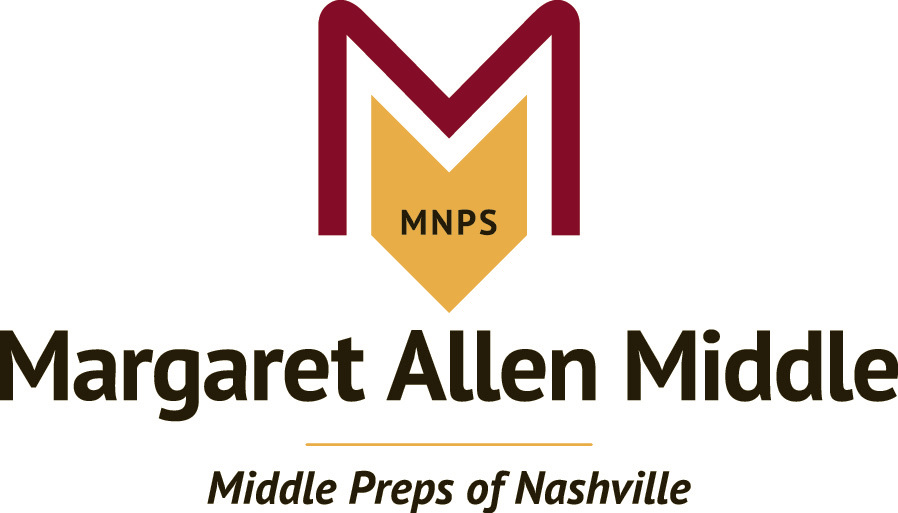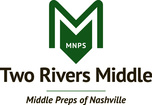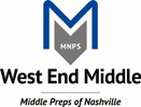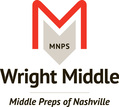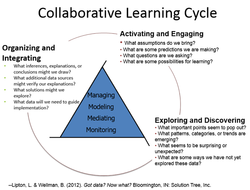 In the last post, I mentioned spotlighting Haynes’ Tuesday Talks. Their Tuesday Talks are the grade level team meetings set aside to have meaningful conversation about issues. I want to share about their use of collaborative inquiry for the last three Tuesday Talks. Remember, we have adopted Laura Lipton and Bruce Wellman’s Collaborative Learning Cycle as our collaborative inquiry process (see image). When looking at using data, one of the hardest things I have found is to take the additional time to go through the Activating and Engaging, Exploring and Observing phases before the last phase of Organizing and Integrating, which means creating theories of causation. On the Tuesday Talk for April 12, the instructional specialist for Haynes, Kisha Spencer, facilitated the meeting. This meeting’s focus was on helping teachers begin to identify a worthy problem of practice. No data was used during this phase. Instead, teachers participated in brainstorming issues they are facing. Two strategies used during this session to facilitate the process were Banned Words, Sort Cards, and Spend-A-Buck. Sort Cards is a great strategy for brainstorming information, and Spend-A-Buck helps the group reach consensus. Using these strategies, Haynes Middle grade level teams reached a consensus to investigate the issue of student behavior and discipline further. On the April 26th Tuesday Talk, Margie Johnson facilitated the Exploring and Discovering phase of the collaborative inquiry cycle as teachers looked at behavior data. The Behavior Dashboard reports from the MNPS Data Warehouse were used during this session while teachers generated observations they were making about the data using Think & Write/Pair & Share and Theories of Causation strategies. The top theory of causation was that students needed social emotional learning support, particularly around self-regulatory skills. A deeper dive into this theory of causation was facilitated by Kisha Spencer on May 5th to answer the essential question, “How do you support students’ social emotional learning, particularly self-regulatory skills, in your classroom?” The strategies used during the meeting were Looking Back/Looking Ahead and Idea, Category, Web. The plan is to then continue the conversations this summer with a Behavior Advisory Committee with diverse stakeholder members. Needless to say, exciting things are happening at Haynes Middle, and I look forward to seeing the expertise from Haynes applied to this meaningful student issue. You can access ALL their meeting agendas, PowerPoints, and handouts at this link: . Do you and/or your team have a spotlight story to share? If so, please email Margie Johnson at [email protected]. I look forward to hearing about the AWESOME work being done by you and your school.
0 Comments
Leave a Reply. |
Email Subscription
Click HERE to subscribe to receive emails for the blog posts. Archives
February 2018
Categories
All
|
- Home
-
Workshop Warehouse
- Collaborative Inquiry for Data Use Workshop (Got Data? Now What?)
- Fishbone and Logic Model Workshop Materials
- Innovation Configurations Materials
- Creating an Evaluation Plan
- Facilitating Collaborative Inquiry Workshop (Dr. Laura Lipton)
- Group Data Exploration (PLI 2016)
- Collaborative Inquiry Community of Practice
- JE Moss Elementary Leadership Team Meeting
- 2016 NCES STATS DC Presentations
- Una Elementary Leadership Team
- Haynes Middle Prep-August 1, 2016
- August 2, 2016--Jere Baxter Middle
- 2016 NTC Nashville Analytics Conference
- Glencliff ES Leadership Team--Sept. 15, 2016
- Haynes MS Leadership Team Culture and Climate Meeting--Sept 19, 2016
- Sept 27, 2016 Two Rivers Leadership Team Meeting
- Rose Park Culture and Climate--2016
- Two Rivers SIP Goal Setting--Sept 20, 2016
- Curriculum and Instruction Meeting--Sept. 30, 2016
- Two Rivers--October 10, 2016
- John Early Culture and Climate--2016
- CTE Cohort--October 11, 2016
- Apollo Middle Milestone Meeting
- Murrell--Culture and Climate 2016-2017
- Margaret Allen--Jan 4, 2017 Culture and Climate
- Head Magnet Middle--Jan 4, 2017
- Apollo Middle--Jan 10 & 25, 2017
- IT Creswell Vision and Mission
- Dr. Springer Literacy CoP
- Two Rivers SIP Process Feb & Mar 2017
- East Nashville SIP March 2017
- East Nashville Behavior Plan May2017
- Family Engagement Data Dive
- Leading Collaborative Inquiry
- DuPont Tyler Middle Vision and Mission
- Facilitating Collaborative Teams
- 2017 SEL Conference Culture and Climate Change
- JE Moss Elementary Leadership Team Meeting--2017
- Goodlettsville Middle Vision and Mission
- CTE Cohort--July 26, 2017
- Joelton Middle Vision and Mission
- Whites Creek High Freshman Academy Vision and Mission
- Goodlettsville Middle Poverty Simulation Follow-Up Meeting
- Exceptional Education Coaches
- Hull Jackson Montessori Poverty Simulation Follow-Up Meeting
- Central Office Poverty Simulation Follow-Up Meeting
- Jones Paideia Poverty Simulation Follow-Up Meeting
- Cole Elem BHAG Fall 2017
- Cole Elem Culture and Climate--2016
- NAZA Data Dive Nov 3, 2017
- Metro Data Coord Meeting Nov 16, 2017
- 2017 Learning Forward Workshop
- Two Rivers Dec 2017 Culture and Climate
- MNPS Learning Tech Jan 2018
- MNPS SE Quadrant Leadership Meeting Jan 2018
- Margaret Allen Middle Jan 2018 Culture and Climate
- MNPS Early Learning Jan 2018
- Lakeview Elementary Jan 2018
- Wright MS SIP Process Jan 2018
- Cane Ridge HS Student Data Chats Jan 2018
- Antioch Middle Spring 2018
- Whites Creek HS Feb 2018
- 2019 Wright MS Leadership PLC
- July 2019--JE Moss Elementary Leadership Team Meeting
- Collaboration Corner Blog
- MNPS Data Guides
- Meeting Structures and Strategies
- Feedback
- Collaborative Inquiry Working Group
- Reading List
- Home
-
Workshop Warehouse
- Collaborative Inquiry for Data Use Workshop (Got Data? Now What?)
- Fishbone and Logic Model Workshop Materials
- Innovation Configurations Materials
- Creating an Evaluation Plan
- Facilitating Collaborative Inquiry Workshop (Dr. Laura Lipton)
- Group Data Exploration (PLI 2016)
- Collaborative Inquiry Community of Practice
- JE Moss Elementary Leadership Team Meeting
- 2016 NCES STATS DC Presentations
- Una Elementary Leadership Team
- Haynes Middle Prep-August 1, 2016
- August 2, 2016--Jere Baxter Middle
- 2016 NTC Nashville Analytics Conference
- Glencliff ES Leadership Team--Sept. 15, 2016
- Haynes MS Leadership Team Culture and Climate Meeting--Sept 19, 2016
- Sept 27, 2016 Two Rivers Leadership Team Meeting
- Rose Park Culture and Climate--2016
- Two Rivers SIP Goal Setting--Sept 20, 2016
- Curriculum and Instruction Meeting--Sept. 30, 2016
- Two Rivers--October 10, 2016
- John Early Culture and Climate--2016
- CTE Cohort--October 11, 2016
- Apollo Middle Milestone Meeting
- Murrell--Culture and Climate 2016-2017
- Margaret Allen--Jan 4, 2017 Culture and Climate
- Head Magnet Middle--Jan 4, 2017
- Apollo Middle--Jan 10 & 25, 2017
- IT Creswell Vision and Mission
- Dr. Springer Literacy CoP
- Two Rivers SIP Process Feb & Mar 2017
- East Nashville SIP March 2017
- East Nashville Behavior Plan May2017
- Family Engagement Data Dive
- Leading Collaborative Inquiry
- DuPont Tyler Middle Vision and Mission
- Facilitating Collaborative Teams
- 2017 SEL Conference Culture and Climate Change
- JE Moss Elementary Leadership Team Meeting--2017
- Goodlettsville Middle Vision and Mission
- CTE Cohort--July 26, 2017
- Joelton Middle Vision and Mission
- Whites Creek High Freshman Academy Vision and Mission
- Goodlettsville Middle Poverty Simulation Follow-Up Meeting
- Exceptional Education Coaches
- Hull Jackson Montessori Poverty Simulation Follow-Up Meeting
- Central Office Poverty Simulation Follow-Up Meeting
- Jones Paideia Poverty Simulation Follow-Up Meeting
- Cole Elem BHAG Fall 2017
- Cole Elem Culture and Climate--2016
- NAZA Data Dive Nov 3, 2017
- Metro Data Coord Meeting Nov 16, 2017
- 2017 Learning Forward Workshop
- Two Rivers Dec 2017 Culture and Climate
- MNPS Learning Tech Jan 2018
- MNPS SE Quadrant Leadership Meeting Jan 2018
- Margaret Allen Middle Jan 2018 Culture and Climate
- MNPS Early Learning Jan 2018
- Lakeview Elementary Jan 2018
- Wright MS SIP Process Jan 2018
- Cane Ridge HS Student Data Chats Jan 2018
- Antioch Middle Spring 2018
- Whites Creek HS Feb 2018
- 2019 Wright MS Leadership PLC
- July 2019--JE Moss Elementary Leadership Team Meeting
- Collaboration Corner Blog
- MNPS Data Guides
- Meeting Structures and Strategies
- Feedback
- Collaborative Inquiry Working Group
- Reading List
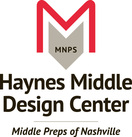

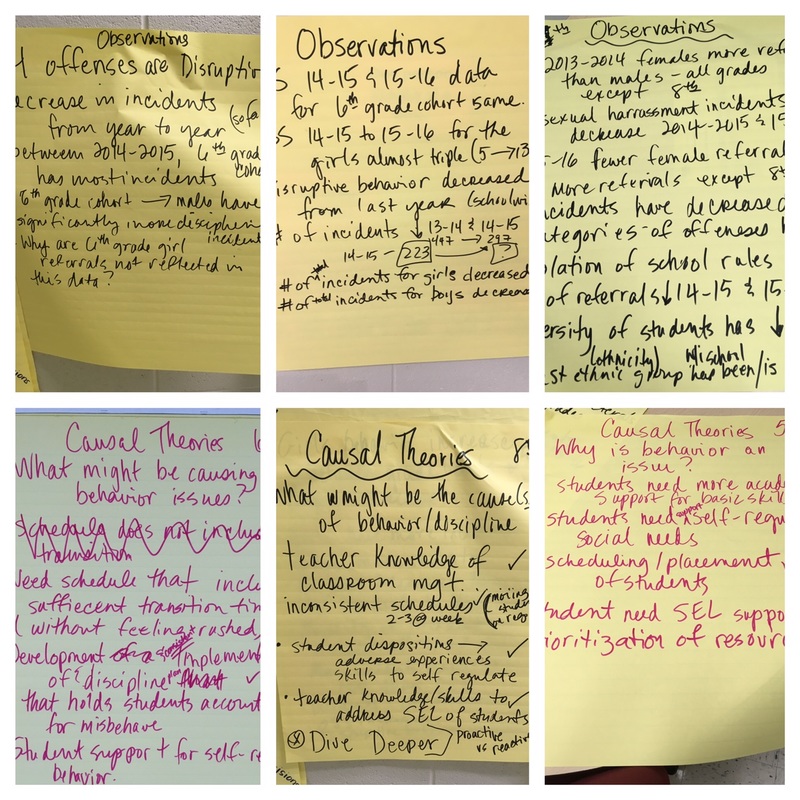
 RSS Feed
RSS Feed

